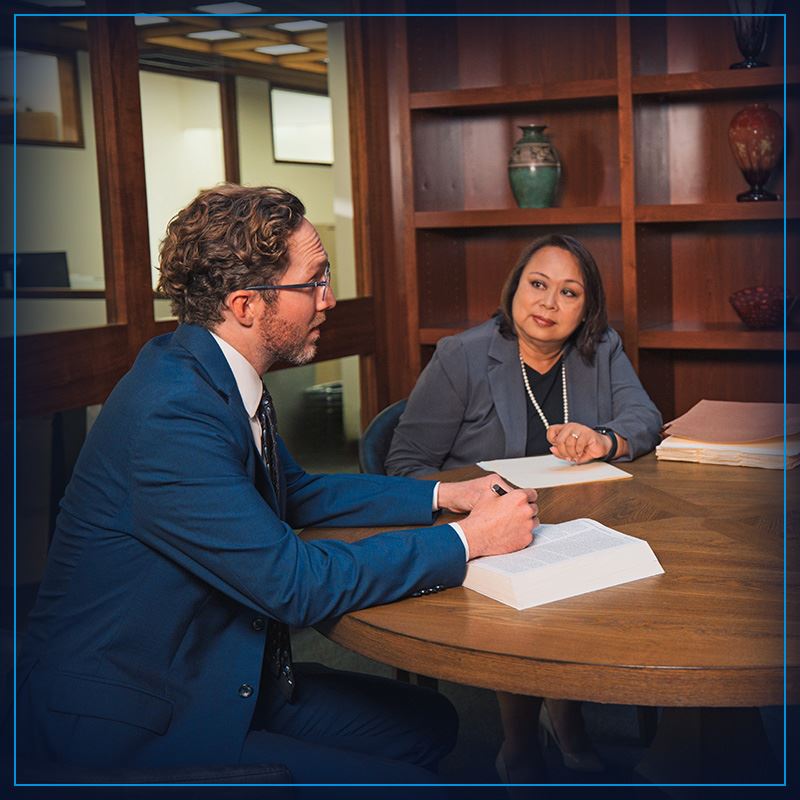

Four Decades of Record Breaking Victories
-
$29,400,000 Medical Malpractice
Physicians at Tripler Army Medical Center failed to order a crucial test that would have detected a twisted gut in a 1-month-old baby, resulting in the loss of 95% of the baby's small intestine and leading to lifelong disability.
Tripler Army Medical Center physicians failed to order the test that would have shown a twisted gut in a 1-month-old baby, resulting in the death of 95% of the baby’s small intestine and life-long disability. -
$9,500,000 Medical Malpractice
Surgeons at Tripler Army Medical Center reattached the small intestine backward during gastric bypass surgery, leading to complications that ultimately resulted in the death of a 31-year-old Army wife and mother of three.
Tripler Army Medical Center surgeons re-attached the small intestine backward during gastric bypass surgery, resulting in complications which eventually killed a 31-year-old Army wife and mother of 3. -
$9,000,000 Medical MalpracticeTripler Army Medical Center left the care of a high-risk labor in the hands of an inexperienced resident. When the laboring mother’s uterus ruptured, the baby’s brain was deprived of oxygen, resulting in cerebral palsy.
-
$9,000,000 Medical MalpracticeAn obstetrician at a private hospital ignored dangerous patterns appearing on fetal monitoring strips indicating birth asphyxia, and failed to perform a cesarean section, resulting in cerebral palsy.
-
$6,500,000 Medical MalpracticePrivate hospital Emergency Department physicians failed to perform the test which would have revealed an aortic dissection in progress, and sent the patient home, where he continued to bleed, leading to lower body paralysis.
-
$5,600,000 Medical Malpractice
A doctor improvised by implanting a shaft of a screwdriver into the spine of our client during surgery. The doctor said that he discovered that our client needed titanium rods to fix his spine in the middle of surgery. Rather than waiting for the medical supply company to deliver the rods, he decided to use the shaft of a screwdriver as a temporary replacement. A few days later, the stainless steel shaft of the screwdriver snapped in the back of the 73-year-old patient, requiring him to undergo several more surgeries. He died two years later of related complications. Read More
-
$5,000,000 Medical MalpracticePhysicians at a private hospital failed to perform a cesarean section where fetal monitoring strips indicated asphyxiation and the Attending Physician could not be found, resulting in injury to the baby.
-
$4,250,000 Medical Malpractice
Our attorneys helped secure a $4.25 million judgment for a client who faces lifelong complications from a botched bariatric gastric bypass surgery.
-
$1,800,000 Medical Malpractice
Our attorneys sought justice against a negligent medical provider whose actions led to the death of 69-year-old woman. The woman died as a result of medical malpractice after seeking treatment for a small bowel obstruction.
Hawaii Medical Malpractice Attorneys
What Is Medical Malpractice/Negligence?
When you visit a doctor’s office, hospital, or another type of medical facility, you trust that the professionals there are qualified to diagnose and treat your condition or injury in an adequate manner. Unfortunately, thousands of patients suffer unnecessary injuries every year due to medical malpractice.
Medical malpractice happens when a health care provider such as a doctor does something that competent doctors would not have done or fails to do what a competent doctor would have done, resulting in injury or death. It is the cause of approximately 100,000 deaths annually in the U.S. Negligent acts or omissions by doctors, nurses, and other medical workers can have severe consequences, often exacerbating an existing condition, causing a new illness or injury, or even leading to fatalities. If you suspect that you or a family member has been the victim of medical negligence or medical malpractice, you should contact an experienced Hawaii medical malpractice attorney to discuss a possible case as soon as possible.
Learn More:
Reach out to Davis Levin Livingston today for a free consultation; call (808) 740-0633or submit an online contact formfor help from experienced Hawaii medical negligence lawyers.
Common Examples of Medical Malpractice
The following are some of the most common acts or omissions that may lead to a claim for medical malpractice:
- Misdiagnosis or failure to diagnose
- Delayed treatment, which can be due to delayed diagnosis, overcrowding in an emergency department, and more
- Administering the wrong type of treatment for the injury or illness
- Retained foreign objects
- Surgical errors, including surgery on the wrong body part, leaving instruments inside a patient, and other mishaps
- Medication errors, including administering the wrong dose of medication or the incorrect medication altogether
- Anesthesia errors
- Birth injuries from negligent prenatal treatment or during childbirth
While doctors are human like anyone else and can make mistakes, a doctor’s mistakes can have serious and sometimes fatal effects. For this reason, medical professionals who engage in any of the above malpractice errors should be held responsible for their actions or omissions. Filing medical malpractice claims also helps prevent future medical negligence by forcing healthcare providers to improve their systems and reduce medical errors.
Medical Malpractice
Cases We Handle

What is the Statute of Limitations for Medical Malpractice Claims?
Statute of limitations laws limit the amount of time a person has to file a lawsuit. The statute of limitations for medical malpractice claims varies by state but typically allows victims only a couple of years to take legal action against the negligent party. In Hawaii, the Hawaii Revised Statutes section 657-7.3 states that medical malpractice claims must be filed within two years from the date the injury or illness took place.
There may be exceptions to this standard, especially if the damages were dormant, unnoticed, or otherwise overlooked for years. However, the Hawaii statute of repose states that all medical malpractice lawsuits must be filed no more than six years from the date of the alleged omission or error.
What Are the Essential Elements of a Medical Malpractice Case?
Four basic elements must exist in any medical malpractice case if it is to be considered a valid claim.
The four required elements of a medical malpractice claim are as follows:
- The doctor/nurse/hospital/etc. had a duty to care for the injured or ill patient.
- There was a breach of duty, meaning the healthcare provider failed to provide the patient with the proper standard of care.
- The provider’s actions caused the patient’s illness or injuries.
- The patient was injured, ill, or suffered damages of some kind.
What Is Informed Consent and How Does It Affect My Medical Malpractice Claim?
Informed consent is being given the opportunity to make an informed decision about the type of medical care or treatment that you receive. Healthcare providers are required to give you enough information to make an educated decision about the type of medical treatment or care that you receive. If a doctor fails to provide you with sufficient, adequate information and it results in injuries you may be eligible to file a malpractice claim.
Once you have been provided with the information and you begin to receive treatment or medical care, it is considered warranted by informed consent. However, this does not necessarily mean that a healthcare provider can’t still be held medically negligent.
Even if informed consent has been given and a healthcare provider fails to provide the appropriate standard of care owed to you as a patient, and you are harmed or injured as a result, you may still be entitled to file a claim.
Medical malpractice is a complicated area of law, which is why you need an experienced Hawaii medical malpractice lawyer to help justify your claim. We understand the laws and rules pertaining to medical negligence and the types of situations that would warrant the filing of a malpractice claim.
What Types of Damages Could I Claim In a Medical Malpractice Case?
Depending on the nature of your medical malpractice case, and the degree to which you suffered, you could be eligible for several different types of damages.
Medical malpractice damages may include:
- Special Damages: Special damages include the most measurable, tangible losses, such as medical bills, lost wages, future medical expenses, and so on.
- General Damages: Though less tangible, general damages are no less important. These types of damages may include physical pain, mental anguish, emotional trauma, loss of enjoyment of life, loss of future earning capacity, and other factors that may influence a person’s quality of life. It's also important to note that Hawaii sets a cap on the amount of pain and suffering damages awarded.
- Punitive Damages: In some circumstances, the injured party may also be eligible for punitive damages intended to punish the liable party for wrongdoing. Rules for such awards are strict in Hawaii.
Additionally, if your loved one lost their life because of a case of medical malpractice, you may be entitled to additional damages through a wrongful death claim.
Federal Tort Claims Act & Your Hawaii Medical Malpractice Claim
Victims of medical malpractice in Hawaii have the right to pursue damages from the doctor or hospital that caused their injury, but what if the malpractice occurred at a government hospital?
While pursuing a medical malpractice claim against a government hospital can be complicated, it is not impossible. If you have been injured at a government hospital, you have the right to recover damages if a federal employee’s negligence is to blame.
What Is the Federal Tort Claims Act?
The Federal Tort Claims Act (FTCA) was enacted in 1946 and allows private citizens to file civil lawsuits against government employees or entities who caused them injury or other harm. Filing an FTCA lawsuit is much more complicated than a traditional civil claim, so it's best to speak with an attorney who has experience handling these types of cases.
Do I Have a Medical Malpractice Claim Against a Government Hospital?
Before you file a medical malpractice claim against a government hospital, you must first establish that you have a valid claim. In addition, a government hospital is protected by the FTCA, which can impact not only your ability to file a medical malpractice claim against a government hospital but also its outcome.
There are important factors that will play a part in how the FTCA will affect your medical malpractice claim against the government, including:
- Negligence – you must be able to establish that a government hospital employee’s actions or lack of actions resulted in your injuries.
- Employee – it must be proven that the person was a federal employee.
- Employment – it must also be proven that the federal employee was acting within the scope of their employment.
A medical malpractice claim against a government hospital is a complicated case. A Honolulu medical malpractice lawyer can talk to you about your legal options if you have been injured because of someone else’s negligence at a government hospital.

Dedicated Legal Counsel You Can Count On
Helping Families throughout hawaii for over 40 years
-
"Professional, KIND, and understanding"
They are most professional, KIND, and understanding. Thank you Matt Winter for all your help.- Clare T. -
"We wouldn't have chosen any other team!"
Mathew Winter and the whole staff of Davis Levin Livingston guided us every step of the way and made sure we understood everything that was going on. They were always so welcoming and compassionate. Communication was never a problem and emails were answered super fast, especially when we had so many questions. They- Maariel -
"The absolute best firm in Hawaii. Compassion and professionalism at its best!"
Truly a wonderful experience with everyone at the firm. I can't thank you enough for helping provide closure for my family and me during this process. The absolute best firm in Hawaii. Compassion and professionalism at its best!- Daniel -
"After doing extensive research I knew that Davis Levin Livingston was the firm for me due to the success they have had in cases like mine."
After doing extensive research I knew that Davis Levin Livingston was the firm for me due to the success they have had in cases like mine. What surprised me was their personal touch. In the 3- Anthony






.1).1).2401101010550.png)





.1910211111556.png)

.1).1910211114162.png)
.1910211111550.png)